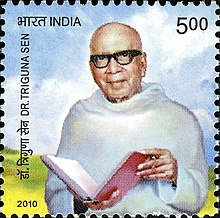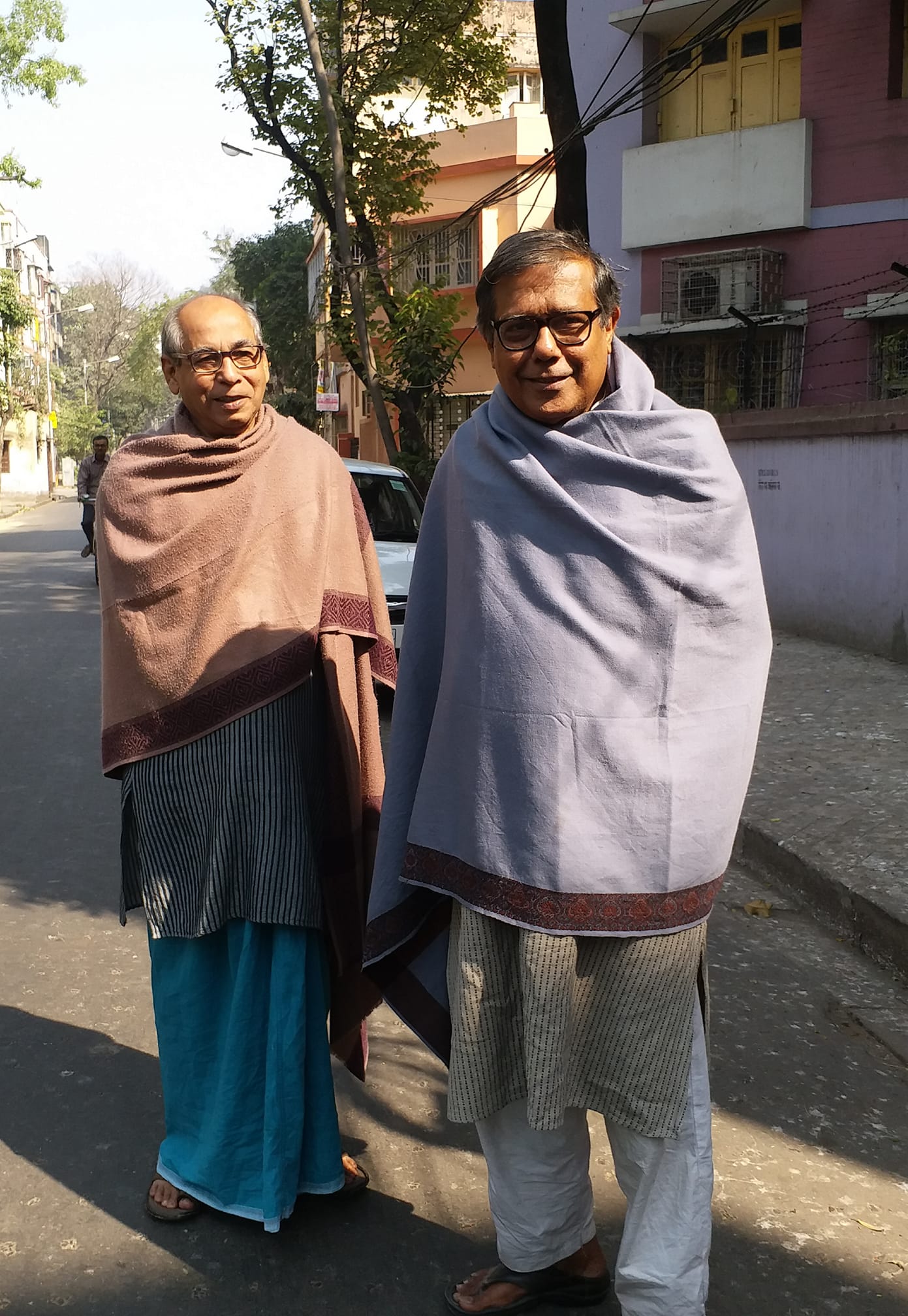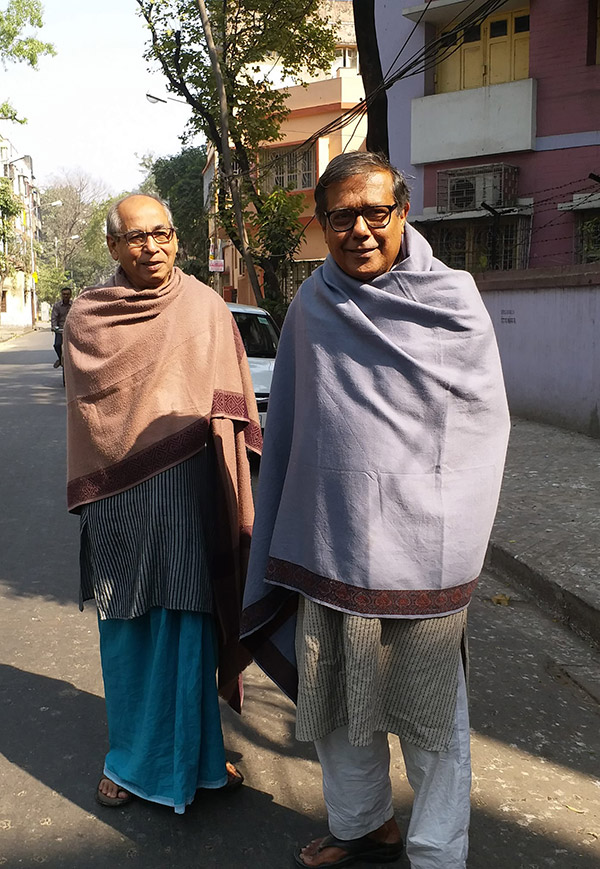Everyone who could, has left. Almost all the children. More than half of the 32 flats of UDICHI – the ‘Co-operative Housing Society’ in Kankurgachi, North Kolkata, where my sister and I grew up – are now peopled either by ageing couples or by widows/widowers. Every year, their numbers increase. Every year, when one more dead body is taken away by an ambulance, the elderly form a shrinking circle of grief — offering flowers to the departed, paying their last respects with bowed heads and stooped shoulders, & lisping quiet commiserations to the surviving partner.
Most of their children have left home – for better study or work opportunities, or else marriage – some in other cities in India (Bangalore, Pune, Delhi); many in other countries/continents (the UK, USA, Australia, Netherlands); a few have returned but are settled in other parts of the city with their own children and spouses.
When my family started living here in 1978, the age-group of our friends spanned the entire school going years – right from play-school toddlers to those appearing for their boards. And every year, there would be someone new appearing for their boards, or clearing medical/ engineering entrance exams, or graduating. We – 21 girls and 22 boys in all – represented a long continuum of learning (read ‘exams’). Then there was a long continuum of leaving UDICHI – for all the reasons enumerated above. Followed by (for most) getting married and having children of our own. Till that point, till the new generation came along, we saw the flow of life through our lives – our education, careers, marriage and kids. That another generation – that of our parents – were simultaneously getting older and frailer, hit us only when the deaths started happening pretty regularly. Initially at a slow pace, but at times striking like an epidemic – like the year my mother left us, when 3 women of Block-B (including her) passed away within 8 months.
Our parents, like us, also represent a wide range, age-wise. The elderly of UDICHI can be anywhere between their early 60s to late 80s. With their children roughly aged between the mid-30s to late-50s. The younger set among the old are, of course, still faring well. Most lead active retired lives, spending time doing household work, buying grocery, cooking, gardening, going for morning/evening walks. Some travel frequently; have visiting children whom they also visit in turn. With those having kids in the same city, a lot of their social time revolves round their grandchildren. It is the really old with children far away who lead the loneliest lives, and who perforce have had to be the strongest – both in terms of resilience and resourcefuness.

Teachers, new brides, mothers & matriarchs
One of the unique things about UDICHI was that it is full of teachers – school, college, university. You name it. The most respected among them was undoubetly the late Dr. Triguna Sen – the first VC of Jadavpur University, who had also been Union Minister for Education and a member of the Rajya Sabha. Dr. Sen lived here for a while with his elder daughter (Mamata mashi), who taught Philisophy at Lady Brabourne. Actually, between us students and the many teachers of UDICHI, we covered most of the major institutions of Kolkata (and some from outside it): from Patha Bhavan & Holy Child to Calcutta Girls/Boys, Loreto & Auxilium, from Presidency & Brabourne to Surendranath & Basantidevi, from Calcutta & Jadavpur University to CMC, RG Kar & ISI. Hardly surprising, then, that most of us fared well acadmically, the importance of high scores to middle-class existence having been dinned into our heads pretty early in life.
Among the parents, whether teachers or not, there were informal groups that were clearly discernible even to us children. One was a group of men of roughly the same age, teaching in different colleges, all of whom started their careers in the same decade and retired a few years of each other. They had one sort of camaraderie. Completely different was another kind of bonding among a group of young women who had come in as new brides to UDICHI – all in the year 1979-1980. Three in particular – Manjula, Mithu & Minku kakima (3 M’s!) – were very close. They were all good-looking and dressed very well. There were also 4/5 other not-so-new brides, who were a little older than them, having married just before coming here or just slightly before the younger ones. The biggest group by far were mothers – who constantly kept themselves updated about what the others’ children were doing and invariably found them better/smarter/brighter/more talented than their own. At the other end of the mothers, was a tiny group of the elderly – matriarchs/patriarchs of a few joint families in the complex. The overwhelming majority, however, were nuclear families, many of whom had previously belonged to a joint set up (like my parents).
These groups, usually meeting randomly within the building premises while going out or coming from somewhere, would become self-evident on Sarawati Puja – the day that UDICHI truly came alive annually. All groups and sub-groups among parents would just not leave each other’s company that day! For us children, it was the most eagerly awaited moment of the year, and it remained so throughout our school years. (It dampened somewhat after that). We were usually all excitement not only for the puja and the delicious communal lunch and dinner that were an integral part of it, but primarily for the cultural program that we put up every year. For which we would rehearse for months.
Bhola kaku & Pradip kaku

I had my favourite ‘kakus’ and ‘kakimas’ (uncles and aunts) while growing up in UDICHI. Of them, Bhola kaku topped the list. He was a Professor of Chemistry at Ramakrishna Mission Vivekananda Centenary College, Rahara, in North 24 Parganas. His wife (Udita kakima) taught the same subject at Lady Brabourne College in Kolkata. They both happen to be avid readers and lovers of literature. While I waited for the school bus in the morning, esp. in my secondary years, kaku would stand and chat with me about books and authors. The one recommendation of his that I particularly remember from that time was Irving Stone’s Lust for Life. I was in class IX, and knew nothing about either the author or his subject then. But I was so mesmerized by the book that I promptly followed it up with The Agony and the Ecstacy, Depths of Glory and later, The Passions of the Mind.
Bhola kaku is a stoic. No matter what he is going through in his life, he has the same smile on his face, and speaks in the same tone of mock-banter whenever he meets me. His ‘me-time’ is 11 pm, when reclining on the railing in his balcony, he silently ruminates in the dark, cigarette in hand. I’ve seen that as a child and teenager, as a young adult, while visiting my parents after marriage, during short annual trips from Amsterdam. I see it even now after returning home.
Bhola kaku has a son, who, after graduate studies in the US, now lives and works in Bangalore. His closest friend is Pradip kaku, who is among the very few parents in UDICHI who are not alone: his only son, recently married, stays with him. Pradip kaku is one of the quietest persons I have met in my life. Unlike Bhola kaku, I didn’t have much interaction with him when I was growing up; and his principal identity for me was that he had a beautiful wife! Mithu kakima – one of the kindest and sweetest women I have known, part of the trio of new brides I just mentioned.
Pradip kaku is the current Secretaryof UDICHI. Bhola kaku had held that post before him for a long time. Between them, they keep the co-operative going. Though of course there is a General Body of ‘Members of the Society’ (comprising of owners of the flats) that meets every few months, as well as a 6-member Managing Committee within the GB, every one knows that if there is any work to be done, than those are the two men that one has to turn to: whether it is getting the gardens behind all the the 3 Blocks spruced up, or the water-tank cleaned, or sundry little requirements like getting hold of the housing-sweeper for extra work, etc.
For their age, Bhola kaku and Pradip kaku look remarkably young. And they look more or less the same as they did 15 years back. No exaggeration there! One of the secrets of their young-looking, slim selves is their daily walk – a ritual that they have kept up with religious regularity. Come rain or shine, you are sure to see the two walking out of the building around 11 am, going to have tea in a ‘para’ (neighbourhood) stall.
It’s a blessing at their age to have a friend nearby. And nothing like if he lives next door. Well, Bhola kaku and Pradip kaku have been next-door neighbours on the 1st floor of Block-A for 40 years now. I never want that to end. I never want UDICHI to have any other association for 11 am than them walking out together to have tea!


